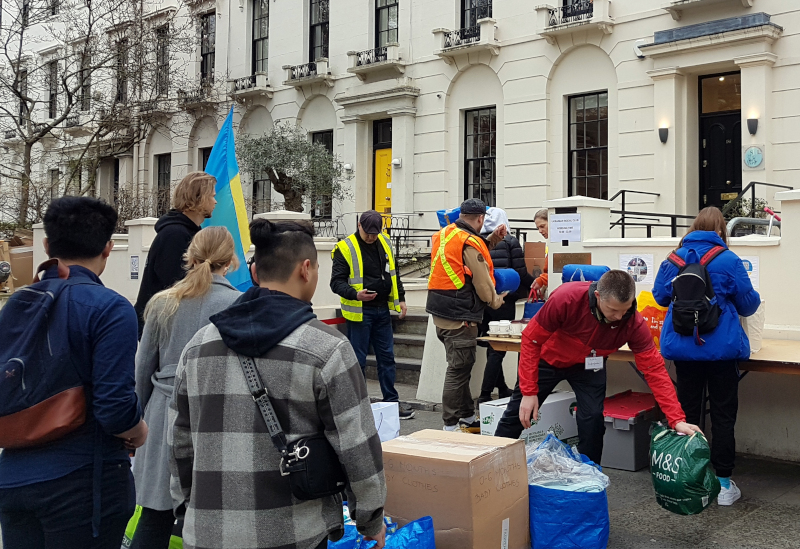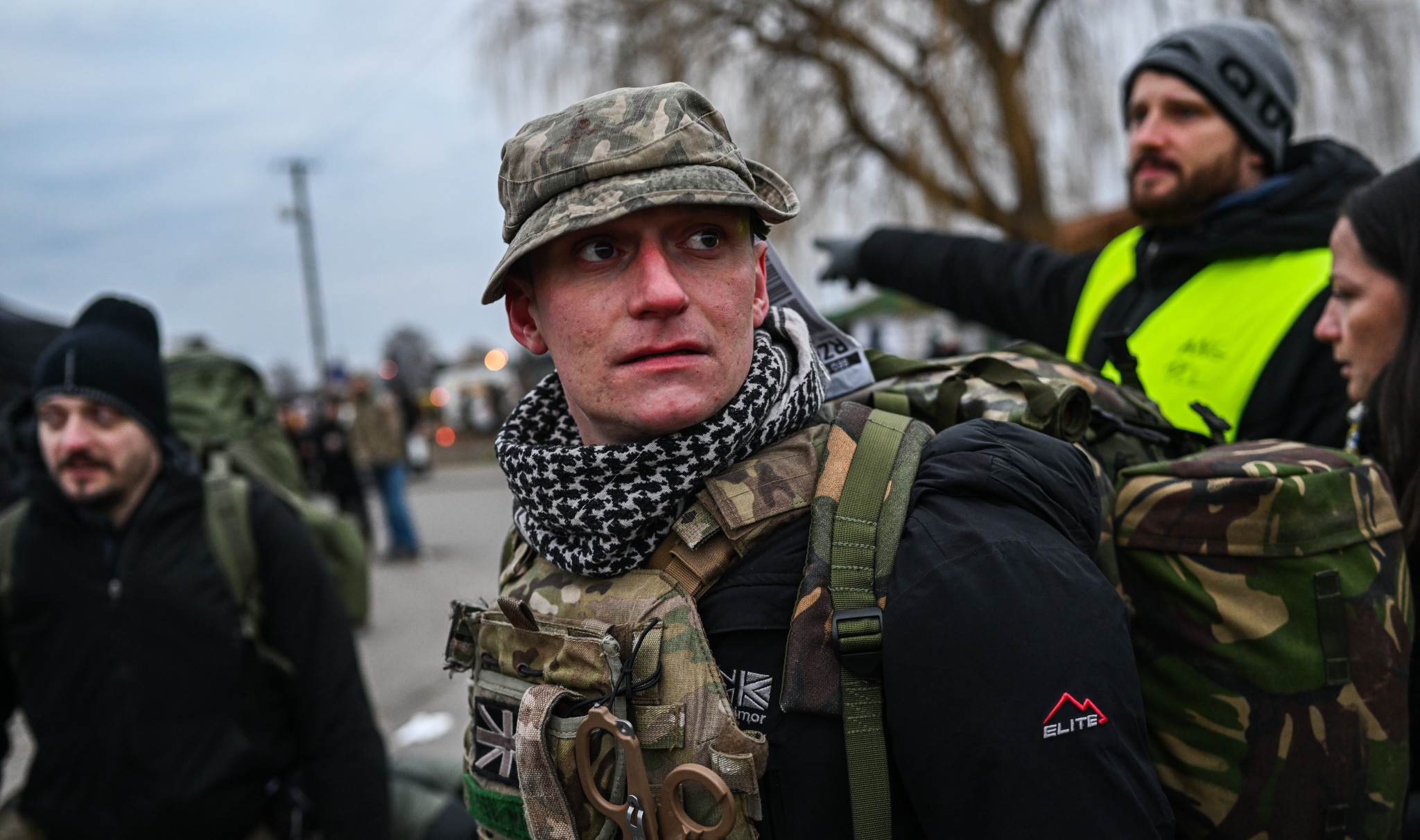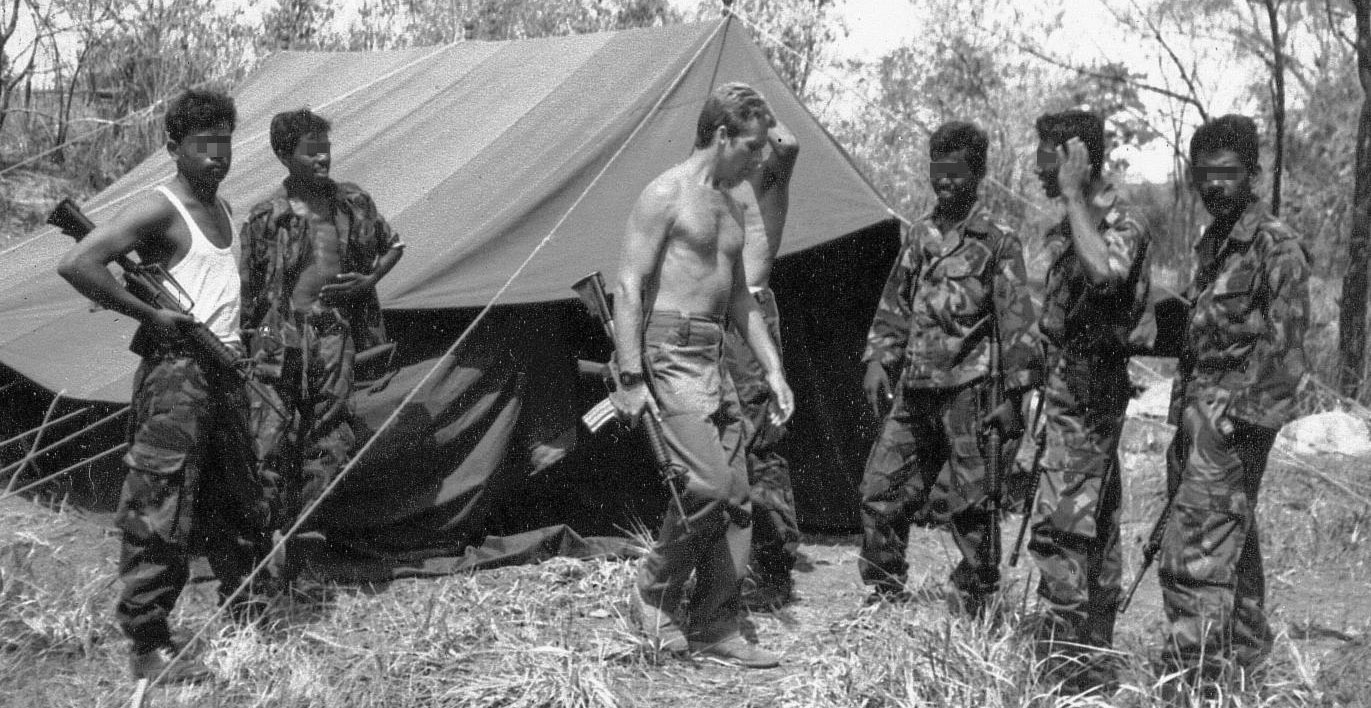At least 6,000 people from Britain are said to be considering joining the new “International Legion of Territorial Defence of Ukraine”.
Ukraine’s president Volodymyr Zelensky set up this foreign legion just days after Russia invaded. It was quickly welcomed by UK foreign secretary Liz Truss.
Asked by the BBC last Sunday if she supported British citizens fighting in Ukraine, Truss replied: “Absolutely, if that’s what they want to do.”
Vladimir Putin immediately took Truss’ comments as a provocation, using it as part of his chilling justification to put nuclear forces on high alert.
By openly supporting such a scheme on national television, Truss broke with decades of Whitehall tradition towards UK mercenaries.
Since the 1970s, Conservative and Labour governments have preferred a policy of plausible deniability. Fighting for a UK ally is not necessarily illegal, but nor is it to be overtly encouraged.
This strategic ambiguity means Britain can indirectly intervene in a foreign conflict, while denying any formal presence to adversaries.
Other officials, perhaps mindful not to give the Kremlin an excuse to claim Nato fighters are in Ukraine, have taken a more guarded approach.
Defence secretary Ben Wallace told Sky: “Unless you are properly trained, unless you are an experienced [former] member of an armed forces, there are better ways for you to contribute to the security of Ukraine.”
Britain’s former top diplomat, Lord Peter Ricketts, who was involved in letting British mercenaries operate “discreetly” in Sri Lanka in the 1980s, warned that: “the Russian army would treat any mercenaries they capture brutally.”
Ukrainian Social Club
The mixed messages do not seem to have deterred more people from signing up to what the Daily Mail has dubbed a ‘Lad’s Army’.
Declassified visited the Ukrainian embassy in west London on Friday, after the initial rush. Yet still waiting outside were a Polish man and Englishman wanting more details of how to sign up.
Justin from Southend said he had no military background but was familiar with rifles having grown up on a farm. “I want to help rescue people,” he added, explaining that his experience of construction work could help him safely navigate bombed buildings.
Justin admitted to not knowing much about Ukraine, but said “My grandfather fought for my freedom” – and now it was his turn. He would be going with permission from his family, estimating he could get there within three weeks.
At the embassy, Justin and the Pole were greeted by a Ukrainian soldier, who directed them to a nearby address. This turned out to be the Ukrainian Social Club on Holland Park Avenue.
Amid a flurry of donations of nappies, cash and food arriving on the pavement, an ad hoc military recruitment scheme was also in operation. Word passed inside, until a man called Oleksandr emerged onto the street, wearing a trench coat and trilby hat.
“The only course of action right now is to contact these guys,” he told the new volunteers in hushed tones, handing out slips of paper with an email address. After a short briefing, the pair headed down the street for a lunchtime drink, jubilant at their new career.
“Send me to Kyiv!” the Polish man grinned, before saying it could take him two months to get there. Payment was no problem. He had savings and would fight for free.

‘Structure is forming’
Later Oleksandr told Declassified, “People are coming, but it’s not overwhelming yet. They’re still figuring it out and a structure is forming.” The reaction in Ukraine has been “extremely positive. Everyone there is thankful.”
Army surplus stores are being scavenged for uniforms and supplies, while some first aid and medical training might be provided in London.
Both men and women are among those signing up. Whether they are sent to the frontline, “depends on their skills.” Their military camp “should be in Ukraine,” not Poland, Oleksandr thought.
One thing is certain. They will face “shitty conditions. It’s a war,” he said. “Some of them will lay down their lives.” But he hoped that “very, very few” would die.
If captured, “they will be treated a little bit better than Ukrainians, I imagine. How much better depends on individuals. It becomes personal.”
From Ukraine’s point of view, the more foreigners who join their fight, the better – especially if they come from Nato states, as it might draw the West deeper into actual fighting.
Some reports suggest that hardened British veterans, including from the Parachute Regiment and special forces, have already made it to Ukraine.
Today, Ukraine’s armed forces tweeted a video apparently showing British volunteers arriving in Ukraine. One of the men, called Jacques, said: “We’re here to help stop the invasion of Ukraine. Hopefully we’ll win. Most of us are ex-military, so [I] think we’re all very well trained.
“The motivation is obviously the war crimes that are being committed shouldn’t be committed…bombing civilian targets, executing civilians, raping females, it shouldn’t happen and it needs to be stopped.”
‘Unlawful’
Perhaps mindful that the situation could spiral out of control, the UK military appears to be taking a tougher line. Yesterday, armed forces chief Admiral Tony Radakin told the BBC that war “isn’t really something that you want to rush to in terms of the sound of gunfire.”
There is particular concern that army reservists might decide to join the fight, further muddying the water. Radakin said: “It’s unlawful as well as unhelpful for UK military [personnel] and for the UK population to start going towards Ukraine in that sense.”
Whilst it might be illegal for serving soldiers to go AWOL and pop up in Ukraine, it is less clear which law Radakin was referring to for the general public. Britain has no blanket ban on mercenaries and has even lobbied the United Nations to prevent one being passed in international law.
Instead, Whitehall has preferred to use anti-terror legislation to criminalise Britons who fight for banned groups like Islamic State, or if they travel to a “designated area” where terrorists are based. On top of that, the Metropolitan Police can investigate anyone they suspect of war crimes.
Last month, security minister Damian Hinds told parliament: “Where a UK national travels overseas to engage in potentially unlawful combat or conflict, they should expect to be investigated upon their return to the UK, to establish whether they pose a risk and whether any offences have been committed.”
Sorcha MacLeod, chair of the UN’s Working Group on the use of mercenaries, said in a statement issued Friday: “We are witnessing the ever-increasing presence of mercenaries and mercenary-related actors in contemporary armed conflicts and the ever-mounting risk of grave human rights abuses and war crimes.”




